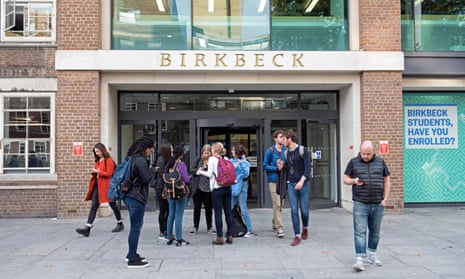Founded as the London Mechanics’ Institute in 1823, Birkbeck – which since 1920 has been part of the University of London – belongs to a rich tradition of which Britain should be proud. Preceded by two years by the pioneering School of Arts of Edinburgh (now Heriot-Watt University), Birkbeck’s mission was to extend the Enlightenment to working people. Dr George Birkbeck gave lectures to craftspeople, but the new colleges were not limited to technical education. They also taught arts, science and philosophy. Birkbeck admitted women decades before the universities of Oxford and Cambridge.
That precious legacy is now in jeopardy. Citing financial pressures, the college’s bosses propose to cut up to a quarter of all teaching staff from departments including English and geography, plus up to a third of administrators. The pattern is being mirrored elsewhere. Universities that were committed to levelling up long before it became a Conservative soundbite have shut or shrunk courses that don’t fit the government’s narrowing agenda.
These colleges are the places with the longest traditions of teaching working-class men and women, often part-time and in the evenings, sometimes as mature students returning to education years after leaving school. Wolverhampton, Roehampton and Aberystwyth are among others with similar roots. At a time when ministers are ostensibly committed to redistributing opportunities towards people and areas that have traditionally had fewer, it is perverse that these kinds of institutions are suffering. Bloated salaries (Birkbeck’s vice-chancellor, David Latchman, earned £380,000 in 2020) make decisions to impose cuts even less palatable.
Specifics may vary but, generally, course closures are blamed on deficits combined with falling demand. This followed the decision in 2016 to lift caps on student numbers, which freed the most prestigious universities to recruit more, but meant places elsewhere went unfilled. It was a crude measure designed to increase market pressures on an already fragile sector. As well as ongoing issues with underfunding, universities were hit hard by Brexit, which continues to affect research, admissions and recruitment.
Higher and further education have a vital role to play in addressing chronic skill shortages, particularly in health and care. But universities making cuts too often appear to lack any strategic vision or sense of accountability to staff, students and wider society. Undermining the humanities is not a substitute for workforce planning, or a stimulus to innovation. Given the unquestionable importance of culture and creativity to the economy, it is more likely to dampen growth – while increasing polarisation, as young people from better-off backgrounds hold on to chances that are denied to others.
Dr Birkbeck and his free-thinking supporters were right. Access to knowledge is a social good. The former mechanics’ institutes should be cherished. That doesn’t mean preserving them in aspic. It does mean making long-term plans that can stand up to scrutiny. Currently, the stewardship by both ministers and managers looks far too scrappy.
